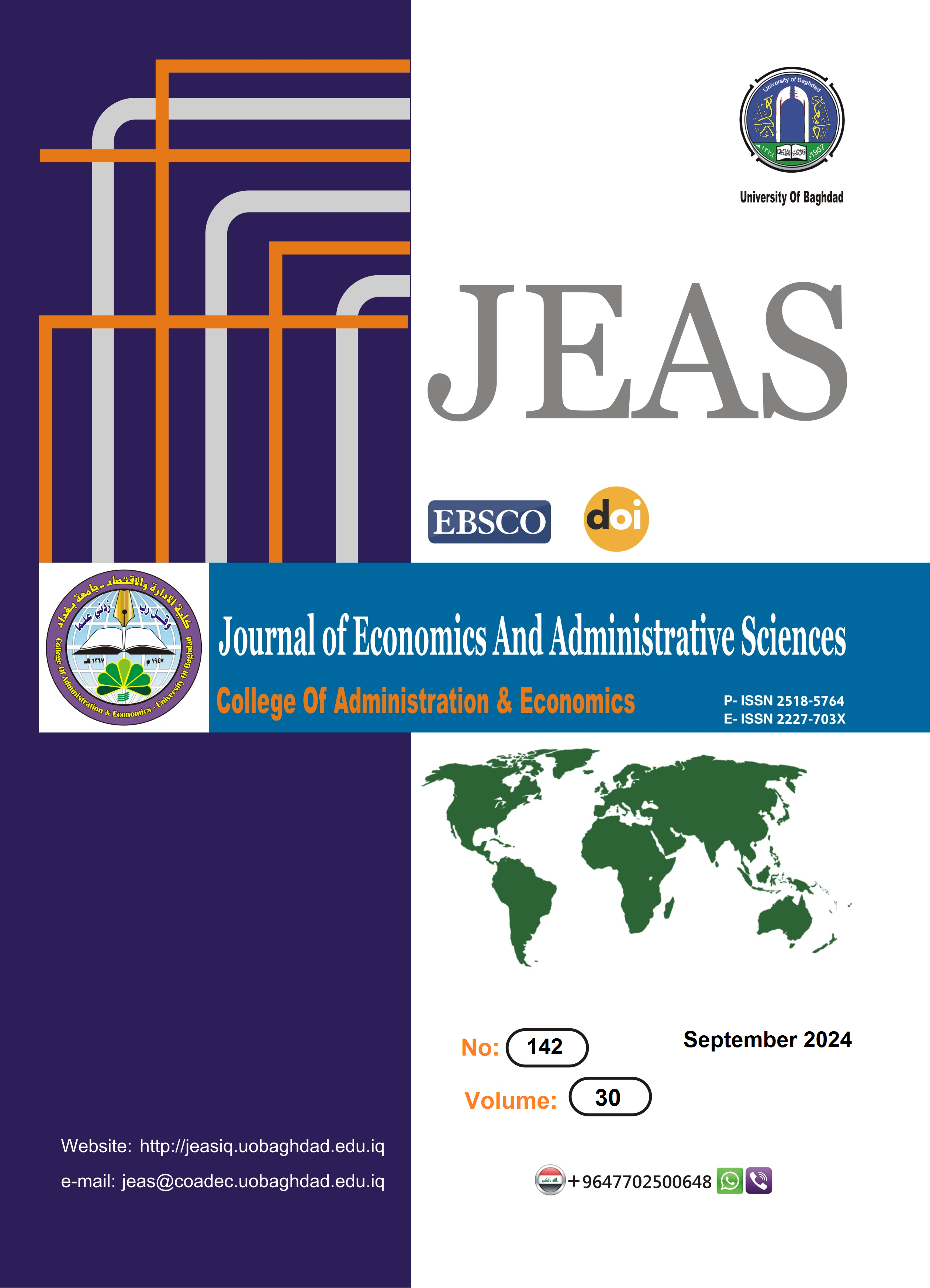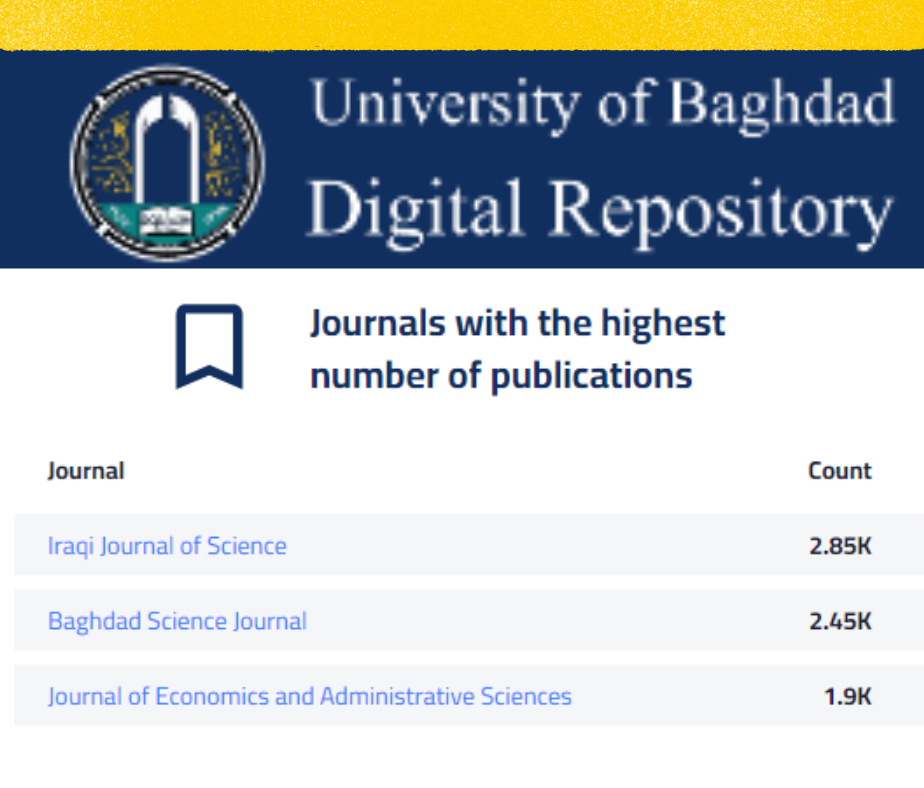The impact of organizational agility in digital transformation: A field research in the Ministry of Higher Education and Scientific Research /Construction and Projects Department
DOI:
https://doi.org/10.33095/74hh6y88Keywords:
organizational agility, digital transformation, Ministry of Higher Education and Scientific ResearchAbstract
The current research aims to clarify the impact of organizational fitness with its dimensions (sensing, decision-making, and execution/practice) as an independent variable on digital transformation with its dimensions (leadership, infrastructure, and resource mobilization) as a dependent variable in the management of construction and projects at the Ministry of Higher Education and Scientific Research. The researcher employed a descriptive-analytical approach and used various statistical tools such as SPSS V21, AMOSE, and Excel to analyze the relationship between the main research variables, answer theoretical and applied questions, examine the level of correlation and influence, and utilize statistical methods like regression coefficients, correlation coefficients, means, standard deviations, and variances. Additionally, various charts and graphs were used to illustrate the relationship between the research variables and their sub-dimensions. The sample was randomly selected from employees of the construction and projects company, with a research community size of 224 and a sample size of 142. One of the key findings is that the impact of organizational fitness and its dimensions plays a crucial role in enhancing digital transformation. Simply put, when attention is given to promoting and effectively implementing organizational fitness in management, the level of digital transformation in the organization is elevated. It's worth mentioning that some dimensions of the digital transformation variable have not been adequately implemented in management, prompting upper departments in the organization to reconsider promoting these concepts due to their importance in advancing and improving the organization's projects.
Research paper
Downloads
References
References:
Abdulquadri, A. and Mogaji, E. (2021). Digital transformation in financial services provision: A Nigerian perspective to the adoption of Chabot. Journal of Enterprising Communities: People and Places in the Global Economy. https://doi.org/10.1108/JEC-06-2020-0126
Ahmed. (2016). Improving the administrative performance of the faculties of Jazan University in light of the organizational agility approach, Journal of Educational Administration, Vol. 3, No. 8, pp. 15-116.
Akkaya, B., and Tabak, A. (2020). The link between organizational agility and leadership: A research in science parks. Academy of Strategic Management Journal, Vol. 19, No. 1, pp. 1-17.
Al Hadid, ANAS. (2016). The effects of organization agility on organization performance” International Review of Management and Business Research, Applied Science Private University, Amman, Jordan, Vol. 5, No. 1, pp. 273.
Al Ajmi, M. K. (2022). The impact of digital leadership on teachers’ technology integration during the COVID-19 pandemic in Kuwait. International Journal of Educational Research, Vol.112, No. 101928,pp.5
Al-Ghobairi, Muhammad Ahmed and Muhammad, Abd al-Rahman Hassan .(2020). The reality of the digital transformation of the Kingdom of Saudi Arabia,” an analytical study, research published in the Journal of Administrative and Financial Sciences, Vol.4, No. 3, pp. 8-31.
Alhadid, Anas Y. and Abu-Rumman, As'ad .(2015). Effective Determinations on Organization Agility Practices: Analytical study on Information Technology Organization in Jordan", In (International Review of Management and Business Research), Vol.4, No. 1, pp.34.
Al-Masry, Marwan Walid.(2016). A proposed strategy to improve the level of organizational agility in secondary schools in Gaza Governorate,” an article published in the Journal of the Faculty of Education in Educational Sciences , Vol. 40, No. 2, pp. 259-342.
Al-Nashili, Dina Helmy Abbas Muhammad .(2020). The Role of Organizational Agility in Achieving Organizational Commitment,” a field study, The Arab Journal of Management, Vol. 40, No. 3, pp. 169-185.
Al-Rawashdeh, Nazik Ali Suleiman. (2022). Digital modernity and its constructive role in business management” Research published in the Arab Journal for Scientific Research, Vol. 48 ,No. 2, pp. 287-305.
Al-Taie, Youssef Hajim, and Al-Abadi, Hashem Fawzi. (2014). Human Resources Management - Contemporary Issues in Administrative Thought), Dar Safaa for Publishing and Distribution, Amman - Jordan.
Amirnejad, Ghanbar and Milad, Zahra .(2015). The effects of organizational culture on organizational agility with mediator role of sharing of knowledge headquarters of national company of the oil-rich re gions in south –ahuaz” Indian Journal of Fundamental and Applied Life Sciences, Vol. 5, No. 3, pp. 1521-1529.
Angela, M. M. (2015 Influence of Strategic Agility on the Competitive Advantage of Private Hospitals in Nairobi County. Master of Business Administration: University of Nairobi, Kenya.
Arokodare, M. A., Asikhia, O. U., and Makinde, G. O. (2019). Strategic agility and firm performance: The moderating role of organisational culture. Business Management Dynamics, Vol. 9, No. 3, pp. 01-12.
Benitezm, J., Arenas, A., Castillo, A., and Esteves, J. (2022). Impact of digital leadership capability on innovation performance: The role of platform digitization capability. Information and Management, Vol. 59, No. 2, pp.5.
Berghaus , S .(2018 ). The Fuzzy Froht End Of Digital Transformation : Activities And Approaches For Initiating Organizational Change Strategies " Dissertation Of The University Of ST , Germany .
Berghaus, S., and Back, A. (2016). Stages in Digital Business Transformation: Results of an Empirical Maturity Study. In Mediterranean Conference on Information Systems (MCIS) ,pp. 1–17
Besson ,p . Rowe ,F . (2012). Strategizing information systems-enabled organizational transformation:A trans disciplinary review and new directions, Journal of strategic Information systems , Vol. 21, No. 2, pp.103-124.
BĠÇER, M .(2021). The Advantage of Being an Agile Organization in the Pandemic Crisis. Stratejik Yönetim Araştırmaları Dergisi, Vol. 4, No. 2, pp.123-141.
Dagher , Harhoush,and Munqith Muhammad .(2000). Organization Theory and Organizational Behavior, First Edition, National Book House, Baghdad.
DongBack, S., Ariel, L. (2008).Exploring the Dark Side of IS in Achieving Organizational Agility .communications of the ACM. Vol. 51, No. 11, pp136-139.
Eden, A. B. Jones, V. Casey, and M. Draheim, (2019), "Digital transformation requires workforce transformation", MIS Quarterly Executive, Vol. No.18, pp1
Gerald, E., Obianuju, A., and Chukwunonso, N. (2020). Strategic agility and performance of small and medium enterprises in the phase of Covid-19 pandemic. International Journal of Financial, Accounting, and Management, Vol. 2, No. 1, pp. 41-50.
Hamad, Zaina Mustafa Mahmoudand and Yozgat, Uğur.(2017). Does organizational agility affect organizational learning capability? Evidence from commer-cial banking " Management Science Letters Vol. 7 ,pp. 407–422
Hamedi, Javad and Azimi, Alireza.(2013). Identification and Prioritization of Interorganizational Success Factors in Microbial Biotechnology Firms", Journal of Virology & Microbiology, vol. 2013, Article ID 190528, 8 pages .
Kale, E., Aknar, A., and Başar, Ö. (2019). Absorptive capacity and firm performance: The mediating role of strategic agility. International Journal of Hospitality Management, Vol. 78, April 2019, pp. 276-283.
Mitroulis, Dimitrios and Fotis Kitsios (2019)” Digital transformation strategy: A literature review” Digital transformation strategy: a literature review, pp. 59-61
Nafei, W. A. (2016). Organizational agility: The key to improve organizational performance. International Business Research, Vol. 9, No. 3, pp.97-111
Ogunleye, P. O., Adeyemo, S. A., Adesola, M. A., and Yahaya, Y. (2021). Strategic Agility and Small and Medium Enterprises’ Performance: Evidence from Osun State, Nigeria. South Asian Journal of Social Studies and Economics .Vol. 11, No. 1, pp.26-36
Olivia, F., Ardian, A., Najah, L., and Md, N. A. M. (2020). Towards SMEs’ digital transformation: The role of agile leadership and strategic flexibility. Journal of Small Business Strategy. Vol. 30, No. 3, pp.65-85.
Park, Y. K. (2011). The Dynamics of Opportunity and Threat Management in Turbulent Environments: The Role of Information Technologies. (Ph.D. Dissertation), University of Southern California.
Rassoo, Roshan, Dissanayake,d.m. digital transformation for small and medium enterprises (smes) : with special focus on sri lankan context as an emerging economy. International Journal of Business and Management Review, Vol.7, No.4, pp.59-76.
Saputra, N., Nugroho, R., Aisyah, H., and Karneli, O. (2021). digital skill during covid-19: effects of digital leadership and digital collaboration. Journal Alpacas Management, Vol.19, No.2, pp.272-281.
Shams, R., Vrontis, D., Belyaeva, Z., Ferraris, A., and Czinkota, M. R. (2021). Strategic agility in international business: A conceptual framework for “agile” multinationals. Journal of International Management, Vol.27, No.1, pp.100.
Tooranloo, H. S., and Saghafi, S. (2019). Investigating the impact of using knowledge management on organisational agility through competitive intelligence and strategic thinking. Journal of Information and Knowledge Management, Vol.18, No.02, pp.195.
Trinh-Phuong, T., Molla, A., and Peszynski, K. (2012B). Enterprise systems and organizational agility: A review of the literature and conceptual framework. Communication of the Association for Information Systems, Vol.31, No.8, pp.167-193.
Vial, G. (2019). Understanding digital transformation: A review and a research agenda. Journal of Strategic Information Systems, Vol.28, No.2, pp.118-144.
Zeike, S., Bradburry, K., Lindert, L., and Pfaff, H.( 2019). Digital Leadership Skills and Associations with Psychological Well-Being, International Journal of Environmental Research and Public Health, Vol.16, No.14, pp. 2628.
Published
Issue
Section
License
Copyright (c) 2024 Journal of Economics and Administrative Sciences

This work is licensed under a Creative Commons Attribution-NonCommercial-NoDerivatives 4.0 International License.
Articles submitted to the journal should not have been published before in their current or substantially similar form, or be under consideration for publication with another journal. Please see JEAS originality guidelines for details. Use this in conjunction with the points below about references, before submission i.e. always attribute clearly using either indented text or quote marks as well as making use of the preferred Harvard style of formatting. Authors submitting articles for publication warrant that the work is not an infringement of any existing copyright and will indemnify the publisher against any breach of such warranty. For ease of dissemination and to ensure proper policing of use, papers and contributions become the legal copyright of the publisher unless otherwise agreed.
The editor may make use of Turnitin software for checking the originality of submissions received.













 How to use the OJS system
How to use the OJS system 










